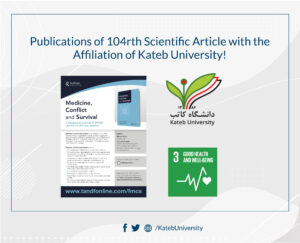In order to achieve Sustainable Development Goals (SDGs) (SDG3: Health and Well-Being), Kateb Research Center published the 104th scientific article with the affiliation of Kateb University.
Scientific article by Dr. Mohammad Yasir Essar, a researcher at Kateb Medical Research Center, entitled “Mental health impacts of humanitarian crisis on healthcare workers in Yemen” was published in the prestigious journal of “Medicine, Conflict and Survival”.
Abstract from the article:
Health care workers (HCWs) in Yemen are at high risk of exploitations, harassment, and physical and mental abuse. With the increase in the number of COVID-19 cases in Yemen, poor healthcare infrastructure and rising tensions health care worker are paying the cost.
Yemen in enduring the consequences of multiple converging systems, all of which negatively impact frontline HCWs. A reduced healthcare capacity, multiple disease outbreaks, an economics crisis, and the politicization of humanitarian aid are contributing factors. The destruction of local hospitals, lack of proper healthcare equipment and security, and a small healthcare workforce exacerbate the situation. As a result, burnout rates and mental illnesses, including depression and anxiety, have increased drastically for HCWs. This has contributed to the overburdening of the healthcare system, and a deficiency of psychosocial support only worsens the situation. Yemen has 45 psychiatrists and 198 neurologists meaning that one psychiatrists or neurologists serves a population of 500,000.
The need for psychosocial support has increased in a community that stigmatizes mental health both for the general population and HCWs. However, frontline HCWs bear the extra burden of traumatic experiences, long working hours, and an acute lack of financial support. Therefore, this commentary aims to talk about the mental health impacts of humanitarian crises on HCWs in Yemen.
Interested people can find the article here.

Sharing: